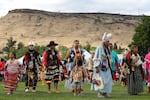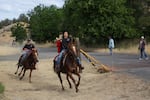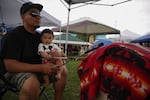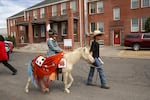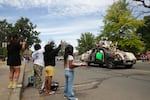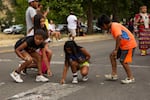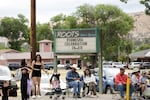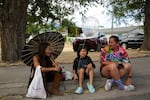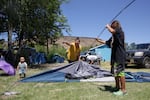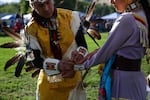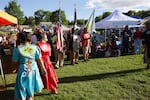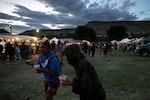
Bernice Jim, 83, attends the Pi-Ume-Sha celebrations in Warm Springs with her family. The event, also known as Treaty Days, celebrates the Treaty of 1855, executed between The Wasco and Warm Springs Tribes and the United States.
Kathryn Styer Martínez / OPB
Zola Jack (Jim), 53, has been attending Pi-Ume-Sha since she was a little girl.
The event, also known as Treaty Days, marked its 55th year on the Warm Springs Reservation. It celebrates the Treaty of 1855, executed between The Wasco and Warm Springs Tribes and the United States.
The treaty created the Warm Springs Reservation on a small fraction of the tribes’ original 10 million-acre territory, while reserving tribal members’ rights to fish, hunt and gather plants at their “usual and accustomed stations.” In the 1870s, the U.S. military forced members of the Paiute Tribe onto the same reservation, and in 1937, the three tribes organized as the Confederated Tribes of the Warm Springs Reservation of Oregon.
Over the weekend, tribal members celebrated the 1855 treaty with a powwow, endurance horse race, rodeo, stick game, softball game and parade from the schoolhouse to the powwow grounds.
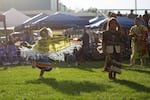
Dancers at the 55th Pi-Ume-Sha celebration take to the grass for the evening dances on Saturday, June 29, 2024. An announcer at the event says the point of the events is to teach children community traditions in the hopes that they continue to practice and teach their children in the future.
Kathryn Styer Martínez / OPB
This was the second year that Pi-Ume-Sha had been held since being canceled due to the coronavirus pandemic, and the first year that the event spanned three days instead of two.
Vendors like Elsie Stanley and her husband Bahe arrived as early as possible to set up their tents. Vendor spaces are first come-first served at Pi-Ume-Sha, Elsie said.
The couple drove overnight from Arizona to make it to Warm Springs in time to get a good spot. They were at the SIR-Powwow in Susanville, California the weekend before and needed to head home before coming to Oregon.
Vendors like the Stanleys make a significant portion of their income at powwows and will travel many hundreds if not thousands of miles throughout the summer.
Many attendees at Pi-Ume-Sha either live on the Warm Springs Reservation or were part of the Confederated Tribes of the Warm Springs, while some came from out of state.
Jessie Walker, a member of the Confederated Tribes of the Colville Reservation, hauled her two horses, Peaches and Goldfish, nearly 400 miles from Omak, Washington to compete in the barrel racing and break-away roping rodeo events. She said she likes the spotlight on Native Americans who participate in rodeo because it’s becoming a uniquely rural experience.
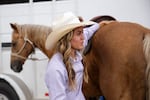
Jessie Walker walks around her horse, Goldfish, keeping a hand on the hindquarters at the Pi-Ume-Sha rodeo in Warm Springs on Saturday. Walker, a member of the Confederated Tribes of the Colville Reservation says doing rodeo isn’t common for Native Americans today—most of whom live in urban areas.
Kathryn Styer Martínez / OPB
About 70% of all Native American people live in urban areas, according to the Urban Indian Health Institute.
Anson Begay, 56, grew up in Warm Springs. He said keeping and riding horses used to be more common. The rising cost of keeping and transporting horses, and young people who are more interested in smartphones and video games, have carved away interest from equestrian hobbies, he said. Begay’s children competed in the endurance horse race. His daughter, Joletta, won third place in the junior category and his son, Atcitty, won the senior competition.
At the powwow, one of the dancers in the under-six-years-old category won a piece of regalia and immediately put it on.
That’s the point, said the announcer: To teach their children the traditions of their community in the hopes that they continue to practice and teach their children in the future.
For Jack (Jim), she said she continues to come to Pi-Ume-Sha to watch the dancers, and to be with family and relatives. She said she mainly “danced traditional” and “some fancy” categories when she was young, but stopped dancing after her cousin died when she was a teen. She looks forward to getting out onto the grass again someday and dancing once more, with all her relations.

